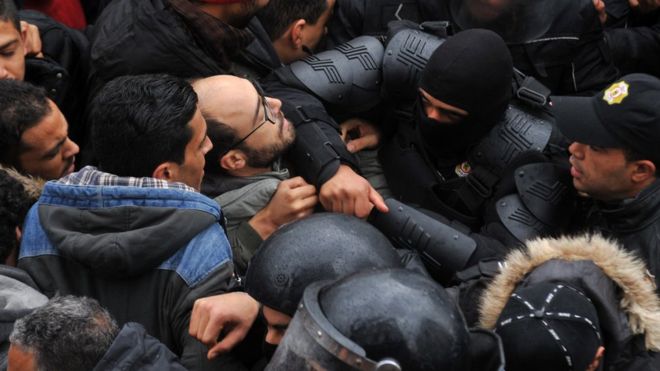 AFP/GETTY
AFP/GETTY
The Tunisian government has announced a wave of social reforms, reacting to days of demonstrations by anti-austerity protesters.
Protests broke out ahead of Sunday's seventh anniversary of the ousting of President Zine al-Abidine Ben Ali.
Emergency government meetings were held in response to protests, which have seen more than 800 people arrested.
President Beji Caid Essebsi visited a district of Tunis on Sunday, saying he understood the people's suffering.
Opposition parties have called for more demonstrations on Sunday, saying that conditions have not improved since Ben Ali was deposed as president at the start of the so-called Arab Spring uprisings.
When did the protests begin and what caused them?
Demonstrations began on 7 January after the government raised value-added tax and social contributions, and increased some prices on goods in its 2018 budget.
Rallies took place in at least 10 different areas, including the capital, Tunis, demanding the budget be abandoned.
They began peacefully but clashes broke out between protesters and police.
The government accused demonstrators of setting fire to police cars and attacking officials. Some people tried to take over shopping malls and stores, while others blocked roads.
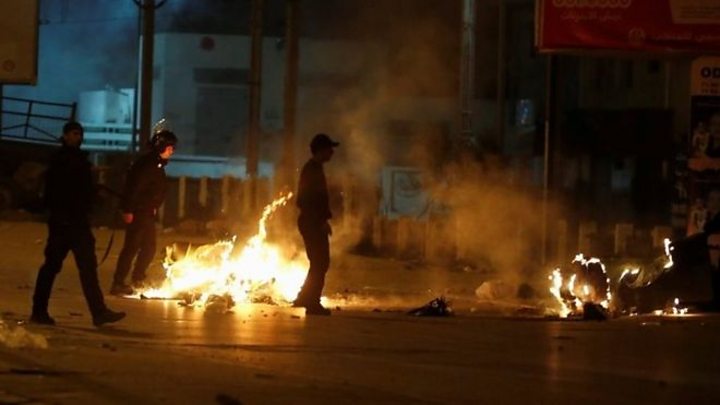
In the town of Thala, near the Algerian border, the army was called in on Wednesday after protesters burned down the national security offices and police were forced to retreat.
The defence ministry said the army was protecting banks, post offices and other government buildings in Tunisia's main cities.
Interior ministry spokesman Khlifa Chibani said on Saturday that 803 people had been arrested so far on suspicion of violence, theft and looting.
He said 97 members of the security forces had been injured, but did not say how many protesters had been hurt.
Demonstrators accused police of a violent crackdown.
What are the reforms being promised?
The announcement came after two hours of crisis talks at the presidential palace that included President Essebsi, political parties and trade unionists.
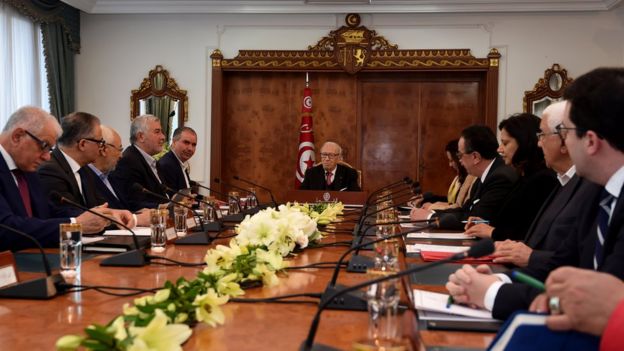 AFP/GETTY
AFP/GETTY
Officials said plans had been submitted to parliament to reform medical care, housing and increase aid to the poor.
Social affairs minister Mohammed Trabelsi said the government proposed increasing welfare payments to those in need by 170m dinars ($70m; £50m).
"This will affect about 250,000 families. It will help the poor and middle class," he said.
Mr Trabelsi also alluded to plans for guaranteed medical care and housing reform.
What did Mr Essebsi say on Sunday?
He has been visiting the marginalised Tunis district of Ettdhamon.
In a short and informal speech, he promised to address youth unemployment and highlighted the government's move to help poorer families, saying: "We feel for you, these are our families."
But he also said: "Be modest, your country does not have a lot of means."
What is Tunisia's economic situation?
Tunisia has been struggling economically since Ben Ali was ousted after more than 20 years in power.
That revolution was sparked by high unemployment and worries about corruption.
However, seven years on, some of the same problems remain - not helped by terror attacks that have hit Tunisia's vital tourism industry and foreign investment opportunities.
In December 2017, the International Monetary Fund (IMF) told Tunisia it needed to take "urgent action" and "decisive measures" to reduce its deficit. The IMF gave the country a $2.9bn (£2.2bn) loan in 2015.
Ben Ali, who lives in exile in Saudi Arabia, was convicted in absentia by a Tunisian court in 2011 of embezzlement and misuse of public funds and sentenced to 35 years.
Africa
ANC leader urges unity as Zuma booed
- 13 January 2018
- Africa
H&M stores trashed over 'racist' hoodie
- 13 January 2018
- Africa
African countries ask for Trump apology
- 12 January 2018
- US & Canada

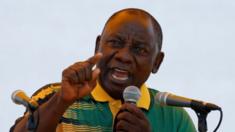
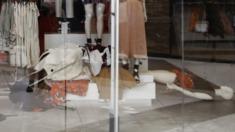

No comments:
Post a Comment